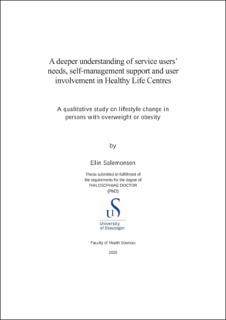| dc.description.abstract | Background: Worldwide, including Norway, overweight and obesity present some of the greatest health challenges. Since the 1980s, the incidence has tripled, leading to a subsequent high prevalence of chronic lifestyle diseases or non-communicable diseases (NCDs), such as cardiovascular disorder, diabetes type 2, some types of cancer, muscle and skeleton disorders and mental health challenges. This has led to an increased focus on lifestyle interventions that emphasise self-management of the condition, as well as the need for users to be readily involved and participating. Therefore, self-management support (SMS) and user involvement have become two important concepts in health services in today’s society. The Norwegian Directorate of Health recommended the establishment of Healthy Life Centres (HLCs) in all municipalities to help facilitate and empower people to obtain a greater mastery of the health challenges they face. HLCs assist persons at risk of NCDs or those in need of support for health behaviour changes or weight management. Behaviour change refers to efforts to change people’s personal habits to prevent disease. The purpose of these self-management interventions is mainly to promote and improve people’s physical activity and diets. There is no clear way of addressing overweight and obesity in primary care; knowledge regarding lifestyle interventions in HLCs and what works is still sparse and needs further investigation.
Aim: The overall aim of this PhD-study was to contribute to a deeper understanding of service users’ needs, beneficial SMS and user involvement in lifestyle interventions in Norwegian primary care HLCs. The study explored adult service users’ and healthcare professionals’ (HPs) experiences and perceptions of these phenomena. Three sub-studies were conducted. The aim of the first study was to explore HLC service users’ experiences of living with overweight or obesity and their perceptions of seeking help to change dietary and activity habits. The second study aimed to explore service users’ experiences of beneficial SMS and user involvement. The aim of the third study was to explore how HPs provide SMS and what user involvement implies for HPs in HLCs.
Methods: This study involved a qualitative, explorative and interpretative
design grounded in hermeneutic methodology and tradition. Semi-structured in-depth interviews with service users participating in lifestyle interventions in HLCs were conducted and analysed using qualitative content analysis. A total of 13 service users (five men and eight women), aged 30-69, from five different HLCs, participated (Papers I and II). Focus groups were used to collect data from healthcare professionals working in HLCs and this was analysed using thematic analysis. 10 healthcare professionals from eight different HLCs participated in two focus group interviews (Paper III).
Results: The analysis of the first study (Paper I) resulted in one main theme: Searching for dignity, which could be split into two themes: 1) Needing to justify avoidance of personal responsibility and 2) A desire to change. In the second study (Paper II), one main theme was identified: Regaining self-esteem and dignity through active involvement and long-term self-worth support in partnership with others. This main theme comprised four themes: 1) Selfefficacy through active involvement and better perceived health, 2) Valued through HPs acknowledgement, equality and individualised support, 3) Increased motivation and self-belief through fellowship and peer support and 4) Maintenance of lifestyle change through accessibility and long-term support. The analysis in the third study (Paper III) resulted in one overall theme: A partnership based on ethical awareness, a non-judgemental attitude, dialogue and shared responsibility, comprising four interrelated themes: 1) Supporting self-efficacy, self-worth and dignity through an attitude of respect, acknowledgement and generosity, 2) Promoting self-belief and self-perceived health, 3) Collaborating and sharing responsibility and 4) Being flexible, adjusting and sharing time.
Conclusion and implications for practice: A synthesis of the findings in the three papers can provide a deeper understanding of service users’ needs, beneficial SMS and user involvement by means of three new themes. The first theme, The dual face of responsibility in health – the burden and the value is based on the service user’s search for dignity and the emotional alternation between shame, guilt and pride. This duality can be understood as a burden of shame and weight stigma that influence the user’s capability to assume personal responsibility. The value can be understood as a perception of dignity, pride, active involvement and assuming responsibility. HPs need to address self-conscious feelings like guilt, shame and internalised stigma, as well as responsibility related to dilemmas about right and wrong lifestyles. The second theme, The art of acting ethically seems to be an integrated attitude of beneficence in HPs’ practice and is demonstrated by their capability to engage in a person-centred approach and to see the service users’ existential needs in a vulnerable situation. HPs’ self-worth support is based on ethical awareness, a non-judgemental attitude, dialogue and shared responsibility. This may help the service users to increase their self-efficacy and self-management and regain their integrity, self-respect and dignity. The last theme, The challenges and possibilities in sharing responsibility, is built on the findings related to HPs treating service users as equal partners in a collaborative partnership based on shared responsibility. The challenges are related to the need for long-term follow-up, emotional and social support, personal responsibility in an obesitypromoting environment and structural and political responsibility. An important therapeutic mechanism in beneficial SMS and user involvement may lie in the possibility of sharing responsibility, which may reduce the burden of personal responsibility, shame, guilt and weight stigma. This may also increase self-efficacy and help service users live a healthier life and experience a better quality of life and wellbeing. Accordingly, there is a possibility of sharing responsibility at a relational level and to highlight collective approaches from a socio-ecological perspective. | en_US |

